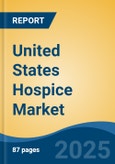Speak directly to the analyst to clarify any post sales queries you may have.
10% Free customizationThis report comes with 10% free customization, enabling you to add data that meets your specific business needs.
Key Market Drivers
Palliative Care Integration is Driving the Demand of the Market
The integration of palliative care within hospice services is a key factor accelerating market growth. Palliative care focuses on improving the quality of life for patients with serious illnesses by addressing their comprehensive needs - including physical discomfort, emotional stress, and spiritual concerns. When embedded within hospice care, palliative services enhance patient support, extending from pain management and symptom control to psychosocial counseling and spiritual guidance. Early incorporation of palliative care enables patients to experience greater comfort and better health outcomes for a longer duration prior to the final stage of life. This integrated approach also promotes transparent communication among patients, families, and healthcare providers, fostering shared decision-making and reinforcing patient dignity at the end of life.Key Market Challenges
Ethical Dilemmas
Ethical dilemmas present a significant obstacle in the hospice sector, often arising from the complexities of end-of-life decision-making. These include challenges in balancing adequate pain relief with the risk of over-sedation, determining appropriate timelines for transitioning from curative to palliative care, and making decisions about withholding or withdrawing life-sustaining treatments. Differences in values, beliefs, and expectations among patients, family members, and medical professionals can further complicate these decisions. One particularly contentious issue is the provision or denial of artificial nutrition and hydration, which often invokes deeply personal and ethical concerns. Addressing these dilemmas requires careful consideration, cultural sensitivity, and collaboration among interdisciplinary care teams.Key Market Trends
Specialized Programs
The hospice industry is evolving to offer more tailored care through specialized programs designed to meet the unique needs of specific patient populations. Pediatric hospice care addresses the medical and emotional requirements of children with terminal illnesses, while perinatal hospice provides guidance and emotional support for families expecting infants with life-limiting conditions.Programs targeting military veterans integrate care strategies that recognize their service and cater to their specific experiences. For patients with dementia and Alzheimer’s disease, specialized initiatives offer focused symptom control and caregiver support. Additionally, holistic programs are emerging to incorporate therapies like music, art, and mindfulness, enriching the patient experience. Transition support programs have also gained traction, providing smoother shifts from curative treatment to hospice services and helping families adjust to evolving care priorities.
Key Market Players
- Kindred Healthcare Inc. (Knight Health Holdings, Inc.)
- Amedisys Inc.
- LHC Group, INC.
- Brookdale Senior Living, Inc
- Chemed Corporation
- Crossroads Hospice LLC
- Seasons Hospice & Palliative Care
- Accentcare, Inc.
- Heart To Heart Hospice
- Oklahoma Palliative & Hospice Care
Report Scope:
In this report, the United States Hospice Market has been segmented into the following categories, in addition to the industry trends which have also been detailed below:Hospice Market, By Type:
- Routine Home Care
- Continuous Home Care
- Inpatient Respite Care
- General Inpatient Care
Hospice Market, By Location:
- Hospice Center
- Hospital
- Home Hospice Care
- Skilled Nursing Facility
Hospice Market, By Diagnosis:
- Dementia
- Circulatory/Heart
- Cancer
- Respiratory
- Stroke
- Chronic Kidney Disease
- Others
Hospice Market, By Region:
- South
- Midwest
- West
- Northeast
Competitive Landscape
Company Profiles: Detailed analysis of the major companies present in the United States Hospice Market.Available Customizations:
With the given market data, the publisher offers customizations according to a company's specific needs. The following customization options are available for the report.Company Information
- Detailed analysis and profiling of additional market players (up to five).
This product will be delivered within 1-3 business days.
Table of Contents
Companies Mentioned
- Kindred Healthcare Inc. (Knight Health Holdings, Inc.)
- Amedisys Inc.
- LHC Group, INC.
- Brookdale Senior Living, Inc
- Chemed Corporation
- Crossroads Hospice LLC
- Seasons Hospice & Palliative Care
- Accentcare, Inc.
- Heart To Heart Hospice
- Oklahoma Palliative & Hospice Care
Table Information
| Report Attribute | Details |
|---|---|
| No. of Pages | 87 |
| Published | July 2025 |
| Forecast Period | 2024 - 2030 |
| Estimated Market Value ( USD | $ 31.33 Billion |
| Forecasted Market Value ( USD | $ 49.08 Billion |
| Compound Annual Growth Rate | 7.7% |
| Regions Covered | United States |
| No. of Companies Mentioned | 10 |









